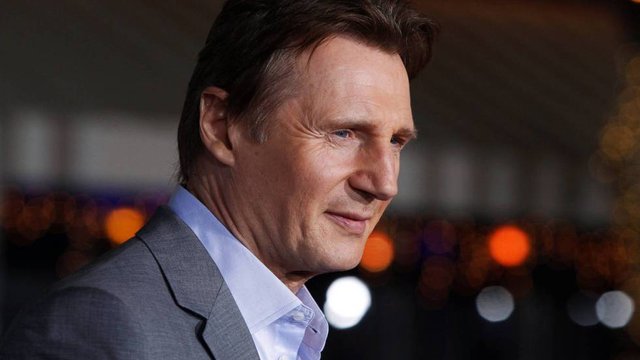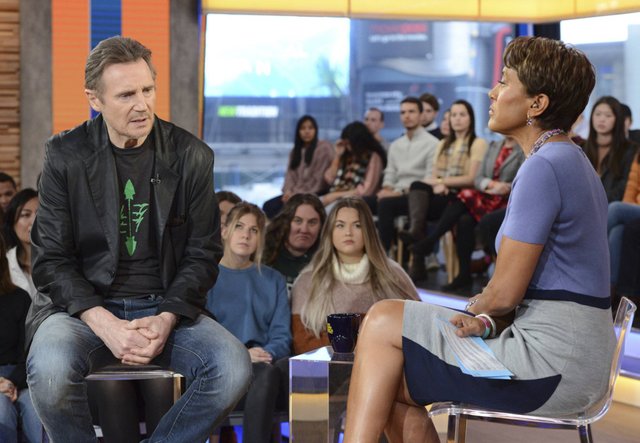Influential black personalities in the film industry request a boycott of the actor for his statements

Actor Liam Neeson caused a scandal by recalling a racist episode of his past and now has to save his career, a challenge that many celebrities have faced in a show business that is usually more merciful than politics or business .
The actor, 66, told in an interview an anecdote from 40 years ago, when he was wandering the streets to "kill" a "black bastard" after learning of the rape of a friend by a black man. A week later, the media continues to echo his words.
The apologies of the British actor the following day on television, stating "I am not racist", have calmed many. But others did not grant him anything. For the black director Ava DuVernay, Liam Neeson is a symbol of the "white privilege", which would lead the public to accept from whites what no one would tolerate for a black person.
In social networks, many people have requested that their scenes in Men In Black be recorded with another actor.

"Do not be surprised if someone does not want to work with you anymore," said actress Regina King, in an interview with The Independent newspaper, which started the controversy over Liam Nesson's interview.
"Acts are generally more damaging than words," said Joseph Caobsky, a professor at the University of North Carolina who specializes in public relations. "But Neeson's case is a bit unique because it was not only what he said, that is, an offensive opinion, but what he said was related to real behavior: sharing a moment when he thought of real violent behavior towards a black man. "
According to several specialists in crisis management, the televised interview that the actor offered the day after the controversy, despite everything, was a good start.
"In a world where everything is instantaneous we have to act faster than before," said Ronn Torosian, founder of the 5W PR agency.
Neeson "should continue to apologize," he said, "and make it clear that he made a mistake rather than try to defend or give the context of his statements."
"Actions speak louder than words," said Steve Jaffe of the Jaffe & Company agency. "He should meet with organizations that are committed to the dialogue on racism."
A strategy that can only work, the specialists said, if it is perceived as sincere and not opportunistic. At this time, none of the ongoing projects of Liam Neeson seems to be threatened by the scandal. But "the reputation I had before the crisis is at risk," said Steve Jaffe, who worked with Bill Clinton. "It's easier to listen to the excuses of a good guy" or to perceive him as such, "than to someone who seems to be trying to keep his job."
Several actors and directors have defended the Northern Irish actor, among them the black actress Whoopi Goldberg. For Mark Hass, professor of strategic communication at Arizona State University, celebrities generally enjoy great public tolerance. "I think the media storm is going to disperse as quickly as it formed," he says of the Neeson case.
Beyond the world of cinema, musicians or politicians also enjoy a relative impunity for their affirmations. "Just look at Donald Trump," says Mark Hass, who makes a clear distinction with the business world.
"The difference is that CEOs usually have a board that can fire them," he said, noting that "that's not the case with celebrities such as Liam Neeson, Mel Gibson or Kanye West."
Mel Gibson is also cited by many as a definitive example of a risen one. Author of homophobic, racist and anti-Semitic statements and accused of domestic violence, this actor and director was considered in 2016 as persona non grata in Hollywood.
After almost a decade of having practically disappeared from public life, he returned in 2016 and returned to be part of the great Hollywood family. The actor Gary Oldman or the rapper Kanye West had each one with their own controversies, but they have not left the stage. And if we broaden the spectrum to sexist or homophobic proposals, several dozen fell into oblivion, despite the momentary violent controversies.
Joseph Cabosky cites the case of Kevin Hart, who fell into a controversy in December over old homophobic statements and resigned recently to present the Oscar ceremony. "His movie The Upside came out a few weeks later," he said, "and it was much better than anticipated."
Warning! This user is on my black list, likely as a known plagiarist, spammer or ID thief. Please be cautious with this post!
If you believe this is an error, please chat with us in the #cheetah-appeals channel in our discord.
Downvoting a post can decrease pending rewards and make it less visible. Common reasons:
Submit